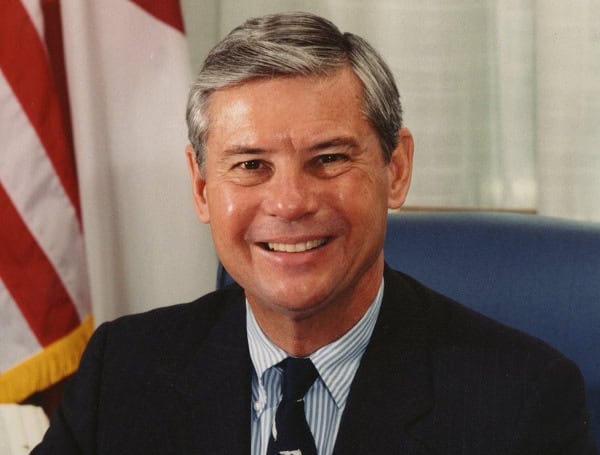Former U.S. Senator and two-term Florida Governor Bob Graham, who rose to national prominence as head of the Senate Intelligence Committee following the 2001 terrorist attacks and an early skeptic of the Iraq war, has died. He was 87.
Graham’s family revealed his death on Tuesday through a statement put on X by his daughter, Gwen Graham.
Graham had a long and illustrious career as a senator and governor. His dedication to public service, coupled with his strong opposition to the Iraq invasion, made him a respected and influential leader.
Read: Florida AG Ashley Moody Leads 23-State Coalition Against EPA’s ‘Disparate Impact’ Regs
Early Life and Political Career
Bob Graham was born on November 9, 1936, in Coral Gables, Florida. His father, Ernest “Cap” Graham, was a successful dairy farmer, and his half-brother, Phillip Graham, was a renowned publisher. After graduating from Harvard Law, Bob Graham entered politics, beginning his career in the Florida House of Representatives in 1966. He focused on education and healthcare issues, laying the foundation for his future political endeavors.
In 1970, Graham won a state Senate seat, and in 1978, he was elected as Florida’s governor. He went on to serve two terms as governor, during which he faced numerous challenges, earning him the nickname “Gov. Jello” for his initial indecisiveness. However, Graham quickly proved his leadership skills by effectively handling several crises.
Senate Career
In 1986, Bob Graham won his first term as a U.S. Senator, defeating incumbent Republican Paula Hawkins. His political career in Washington spanned three decades, during which he became a highly regarded senator known for his dedication to Florida and his constituents. Graham’s popularity with voters was evident in his landslide victories in 1992 and 1998, winning 63 out of 67 counties.
Read: Former Prosecutor Andrew Warren, Suspended By Florida Gov. DeSantis, Launches Campaign
As a senator, Graham was involved in various important committees, including the Intelligence Committee, which he chaired following the 2001 terrorist attacks. His role in overseeing intelligence matters and his opposition to the Iraq invasion solidified his reputation as a knowledgeable and principled leader.
Opposition to the Iraq Invasion
One of the defining moments of Bob Graham’s career was his vocal opposition to the Iraq invasion. He believed that the war diverted America’s focus from the battle against terrorism in Afghanistan. Graham criticized President George W. Bush for the lack of an occupation plan in Iraq after the removal of Saddam Hussein in 2003.
He accused the Bush administration of exaggerating the danger presented by Iraqi weapons of destruction that were never found. Graham argued that this distortion of intelligence data was more serious than the sexual misconduct issues that led to President Clinton’s impeachment. It was this conviction that led him to launch a brief presidential bid in 2004.
Presidential Bid and Legacy
Bob Graham’s presidential campaign was cut short by heart surgery in January 2003, which hindered his ability to gain traction with voters. Despite ending his campaign in October of the same year, his legacy as a dedicated public servant continued to grow. Graham’s commitment to the people of Florida and his tireless advocacy for their needs and aspirations remained at the forefront of his political career.
After leaving public office in 2005, Graham focused on promoting civic education and public policy. He established a public policy center at the University of Florida, which bears his name. Graham also advocated for more civics classes in Florida’s public schools, emphasizing the importance of an informed and engaged citizenry.
Personal Life and Quirks
Bob Graham was known for his unique personality and quirks. He developed a political gimmick known as “workdays,” where he would spend a day performing various jobs, such as being a horse stall mucker or an FBI agent. Graham also kept a meticulous diary, documenting his daily activities, conversations, meals, and even his golf scores.
Despite his Harvard-educated background, Graham connected with Florida voters on a personal level, earning their trust and respect. His political success was rooted in his ability to understand the needs and aspirations of the people he represented.
Help support the Tampa Free Press by making any small donation by clicking here.
Android Users, Click To Download The Tampa Free Press App And Never Miss A Story. Follow Us On Facebook and Twitter. Sign up for our free newsletter.

